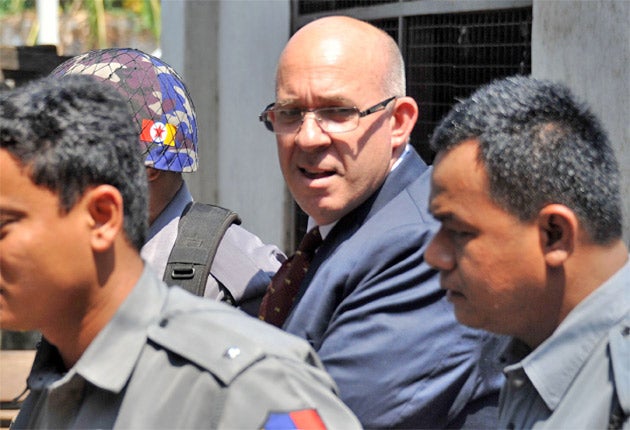Editor goes on trial as Burma's junta cracks down on media

An Australian newspaper publisher accused of providing a mouthpiece for Burma's military junta goes on trial today after a dramatic fall from grace.
Ross Dunkley, 53, the editor-in-chief of the Myanmar Times, is languishing in a notorious Rangoon prison after being charged with immigration offences and drugging and assaulting a woman. He faces up to five years in prison if convicted, according his lawyer.
The brash, chain-smoking journalist was arrested at his home in the city on 10 February and has been held since in Insein prison, infamous for its atrocious conditions and the routine torture of political prisoners. Like other inmates, Mr Dunkley sleeps on a concrete floor, is forbidden to smoke, and must have food delivered to him if he is to eat anything other than stale rice.
His arrest came less than two weeks after the convening of Burma's new parliament, which followed the country's first elections in two decades.
Western governments denounced the elections as a sham, and the parliament as a puppet of the regime, but the generals may nevertheless be anxious to ensure their hold on power is not diminished by the new structure. The arrest of Mr Dunkley, the country's lone foreign publisher, could be a sign of nerves and may mark a tightening of already stringent restrictions on the media.
"During this transition from direct to slightly more indirect military rule, they want to make sure there is no opposition or criticism from any quarter," said Bertil Lintner, an expert on the region and author of several books on Burma.
Mr Dunkley, who founded the dual-language Myanmar Times (using the regime's official name for Burma) in 2000, has never been regarded as a critic of the regime.
His first Burmese business partner, Sonny Swe, was the son of a senior official in the powerful Military Intelligence, or MI, and the paper gained a reputation for being a propaganda arm of the spying department, which was headed by Prime Minister Khin Nyunt.
The good times lasted until 2004, when Khin Nyunt and MI were purged by the top generals, wary of their rising power.
Sonny Swe was thrown in prison but the straight-talking Mr Dunkley managed to persuade the junta to install a new partner, and the weekly paper, printed in English and Burmese, survived.
Exiled Burmese democracy activists have accused the newspaper of simply being a regime mouthpiece. But Mr Dunkley argued that the Myanmar Times, which employs about 350 people, could do more good working within the system. A former colleague who did not want to be named, said: "Ross did not have a showdown with the authorities over censorship – which he would most certainly have lost – but the less obvious contribution to training journalists could be considered just as important to the long-term development of a robust print media in Burma."
Mr Dunkley and his newspaper have had run-ins with the authorities before. In 2007, shortly before the failed uprising led by Buddhist monks, the Myanmar Times mistakenly published a bogus advertisement placed by a Danish group, which contained the concealed message "Killer Than Shwe", referring to the head of the Burmese junta.
Taking advantage of a slight relaxing in censorship in the run-up to last November's election, Mr Dunkley tried to prove his independence by giving ample space in the paper to opposition parties, and allowing an Australian TV documentary crew – who were later deported – to make a film about the Myanmar Times in the weeks before the vote.
Insiders say Mr Dunkley's regime-installed Burmese business partner, Tin Tun Oo, an election candidate for the military's proxy party, was angered by the election coverage, and hatched a plot to oust the Australian editor.
David Armstrong, a business partner of Mr Dunkley's in Cambodia, said: "The arrest coincides with tense and protracted discussions Mr Dunkley and the foreign ownership partners in the Myanmar Times have been conducting with local partners about the future direction of the publishing group, ownership issues and senior leadership roles – all this at a time of significant political and economic change (in Burma)."
Since his arrest, Mr Dunkley has been removed from his post as editor-in-chief of the Burmese-language version of the Myanmar Times and CEO of the company that owns the newspaper.
Both positions have been taken by Tin Tun Oo.
No News Today
Burma is 174th in Reporters Without Borders' Press Freedom index. Four countries are below it:
Iran Nearly 30 journalists in custody. The security services recently started checking content before publication for the first time since 1979.
Turkemenistan The state media is routinely criticised by the government for failing to be enthusiastic about reforms. Journalists risk death if they work independently.
North Korea Kim Jong-il controls the media with an iron fist. A number of journalists are said to have been sent to "revolutionisation" camps for making spelling mistakes.
Eritrea Under the regime of Ali Abdu, some 29 journalists are imprisoned; four more have died in prison since 2001.
Join our commenting forum
Join thought-provoking conversations, follow other Independent readers and see their replies
Comments
Bookmark popover
Removed from bookmarks